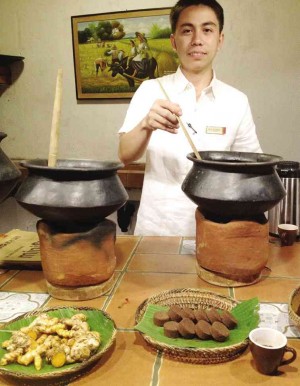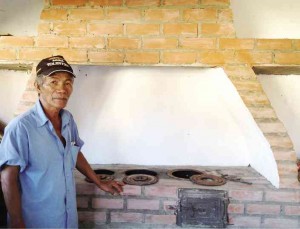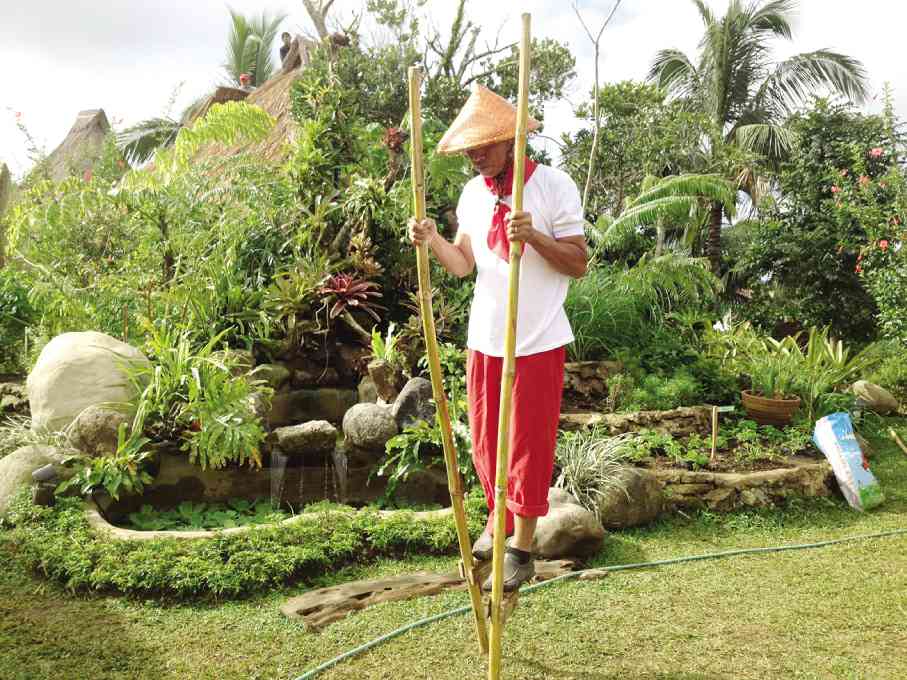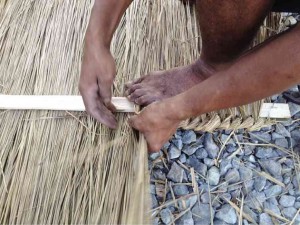In aftermath of typhoon Glenda, Gabriela is born
When typhoon Glenda smashed into Tagaytay City last July, its 150-kilometer-per-hour winds uprooted large trees, blew away roofs and tore down light-to-medium structures along its path, cutting through the premier Cavite city on the ridge around Taal Lake.
Nurture Village, a wellness facility nestled on a hillside slope, was not spared.
The property bore the brunt of the typhoon’s fury more devastating than any seen on the ridge in a long time: buildings, interiors and furniture were damaged, and several thatched roofs were blown away. Total damage to structure and loss of business ran up to approximately P10 million.
Staying afloat
For a small and medium-sized enterprise, it was enough to wipe out a business. But Nurture Village persevered.
Nurture Wellness Village is a family-owned business that constantly strives to stay afloat, provide jobs to its employees while making a decent income.
Founded in 2002 by Cathy Brillantes-Turvill, it has since weathered all kinds of storms to remain Filipino-owned and contributing to the economy.
“While storms and financial challenges may sometimes make things difficult, quitting is simply not an option,” declared the human resource specialist turned entrepreneur.
Immediately after the storm, the bayanihan spirit of the all-Filipino team kicked in. Everyone—from maintenance to cooks and therapists—rolled up their sleeves to help in clearing the massive debris that the storm left in its wake.
“Because of this bayanihan spirit, we were able to get half of the business up and running in three days. We closed half of Nurture to be able to repair the damaged buildings. We sometimes stopped construction to accommodate walk-in clients who wanted to go for spa treatments in a quiet area undamaged by the storm,” she said.
To finance reconstruction, Nurture borrowed money from the bank, dipped into emergency funds and waited for insurance payments to come in.
“We were lucky that we were insured. However, it took quite some time for the insurance company to pay, so we asked our suppliers to give us credit for the materials we needed to rebuild the damaged buildings,” she said.
Owned jointly by Dr. Mike Turvill, a British national who is a Doctor in Organic Chemistry and his wife Cathy, Nurture remains committed to its workforce.
“As business owners, we felt it vital to continue to give income to our staff. We tried our best to bring the business back to life and pay our staff to fix the fences, repair the buildings etc. Waiters became laborers, cooks became cleaners, room boys became construction workers—anything to provide income they needed to feed their families,” she said.
After all, the wellness village is the biggest employer in a remote community that straddles two barangays, with its staff members coming from Brgy. Maitim and Brgy. Talon in Amadeo.
Because of the calamity, the Turvills have instilled in their staff a sense of belonging: “At this point, on our 12th year, we have come a long way for us to give up. We are responsible for running the business well so that we can give job security to our staff and their families.”

RYAN Alvarez makes “luyang dilaw,” duhat tree bark, or native cocoa drink the traditional way at the herbal tea bar of the “farm-to-table” garden cafe named after heroine Gabriela Silang.
Lessons
From their experience, the Turvills share the following lessons:
- It is imperative for all businesses to have insurance coverage to protect their business from natural calamities—typhoon, earthquake etc. Business interruption insurance is likewise important. Make a budget for this. Work only with bigger and reputable companies.
- When dealing with insurance companies, be a careful and informed consumer. Know the types of coverage and ensure you are getting complete and full coverage. Know your rights as well as the terms and conditions of the insurance you are buying. Example, do you know that damage to electrical equipment (computers, etc.) is not covered by typhoon insurance? It falls under EEI (electrical, electronic insurance) coverage. If you don’t have EEI, your insurance company will not pay for damage to your computers by the rains/typhoon. Be prepared for voluminous documentation required by adjusters hired by the insurance company.
- Have emergency funds to tide you over while waiting for the insurance company to pay.
- Have good relationships with suppliers as they can be your key source of help when you need to repair damaged [property].”
Opportunity in crisis
Dealing with a calamity is half the problem solved. The next half is rebuilding and reinventing the business. For the Turvills, the disaster offered an opportunity to explore new horizons.
For the HR practitioner who made a leap of faith pioneering in the spa industry, it has been a constant learning journey, albeit a roller-coaster ride.
“Through the years, we have expanded our services from spa to weddings to wellness to corporate wellness, and now to being a resort,” she said.
It was coincidence that even before the storm struck, “we have been wanting to move strategically away from just being a spa to becoming a resort.” The disaster only served to fast-track this move.
Already a certified spa and wellness educator, Cathy took a rigorous six-week Cornell University online course on Food Service Management to enable Nurture to improve its F&B offerings as part of a Department of Tourism resort accreditation.
The result of that study is a new Filipino-themed dining concept born out of the reconstruction of the premises in the aftermath of Typhoon Glenda.
Nurture was named as an Apec destination in 2015 and Gabriela provides another reason for guests to visit.

SALVADOR Bayot, who learned the traditional pugon design from a Pampango artisan, is Nurture Village’s resident mason.
Named after the Filipino woman warrior Gabriela Silang, who is also known through history as a gifted healer who treated the wounds of native soldiers during battle, the new garden restaurant is both a living museum and a wellness experience in a heritage Filipino ambience.
Cathy launched Gabriela last month in time for the holiday season.
“By offering Arroz Caldo (highly nutritious, laden with garlic and ginger which are healing herbs), a pick-your-own-salad bar, an experiential herbal tea bar and waiters who are very knowledgeable and adept in explaining the various health benefits of the vegetables and herbs in the garden—we have given a Filipino traditional twist or story to our food and beverage offerings, while strengthening the wellness angle,” she said.
Turnaround
The catastrophic event has provided additional meaning to profitability for the Filipino-owned wellness venture.
Profit is measured when the staff grows personally and financially, when local and foreign guests admire the Philippines more, and when more people try a wellness lifestyle and even embrace it.

